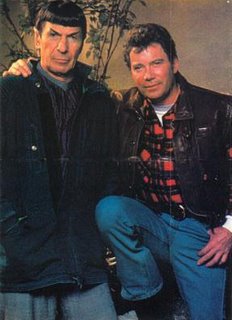I don't subscribe to Creationism in any way other than a highly metaphorical mythical way. I think there's a definite value in recognizing creation stories, and I have yet to find a creation story that I'm not fascinated by. But there are also pitfalls built into any creation story. These are the stories that define us, these are the stories we enact as we go about our bidness.
The thing is this: I don't feel like any of these stories is
mine.
I don't feel like my great great great.... etc. grandparents were actually in a place called Eden and kicked out and denied entry by an angel with a flaming sword. Nor do I feel rabidly protective of evolution (I see great apes and chimps as intelligent, social and somehow my kindred- but this isn't contingent us having a common ancestry, it's more an expression of empathy for my fellow earthlings). I'm not saying the science is bad or inacurate, it just doesn't tell me everything I need to know about who/what/why/when/where I am, not any more than the first chapter of Genesis does.
Daniel Quinn has some interesting thoughts on the the way we enact our stories, and the 19-20th century American philosophical movement called
Pragmatism had a very consequence-based way of looking at belief. They argued that what is ultimately true is what contributes the most good over the longest time. The critical difference between the two is that Quinn seems to look for what benefits the community (in a very broad sense) over the individual and William James (to name a particular pragmatist) looked more at the benefit of the individual over the community. Of course, James is coming from a Christian POV, Quinn is not (and in Christianity the single greatest thing you can do is save yourself!).
Anyway. I've digruss. My friend
David recently posted about
Creationism vs. Evolution and it got me thinking. I find it fascinating that in modern American discourse those are the 2 only options. Of course there's Intelligent Design... but that's just Creationism sans Bible. Removing the disputable recorded details doesn't validate it. It's like saying someone died on a cross to absolve our sins, but it wasn't Jesus, that's crazy! (And not all our design is all that intelligent, why would squids get eyes without blind spots, while we have to hallucinate the contents of a big hole where our nerves and blood vessels connect).
The problem is that we've created this enormo schizm between religion and science, while treating these two (and only these 2) as the possible literal, objective, indisputable truths. Or at least those who define the conflicts of our culture have created this dispute. I honestly think most people just phone in these sort of questions. They're centrists. They're not gonna stop eating pork after reading Deuteronomy, but their not measuring the beaks of swallows in their backyards either.
Honestly, it's all sort of the same. These are just stories. Yes, even science. Stories of a certain language, for a certain purpose, with a certain type of wisdom. These are just models, folks, ideas. Thoughts. Some are repeatable, some are quantifiable. A human life, however, is not. So these science stories ain't gonna cover it all. We need more stories. And because we're actually acting out the ones we've been told longest, the ones that mean the most, the sneakiest ones that we might not even know we're hearing anymmore... we need to make sure they're good ones. Because our creation stories aren't really about how WE
have been created, but about what we are in the
process of creating.
And that ain't no lie.

 I'm so excited I could wet my pants. Nisha might also wet her pants, but for different reasons. Also, she's been really sick, so be extra nice to her if you see her.
I'm so excited I could wet my pants. Nisha might also wet her pants, but for different reasons. Also, she's been really sick, so be extra nice to her if you see her.


































